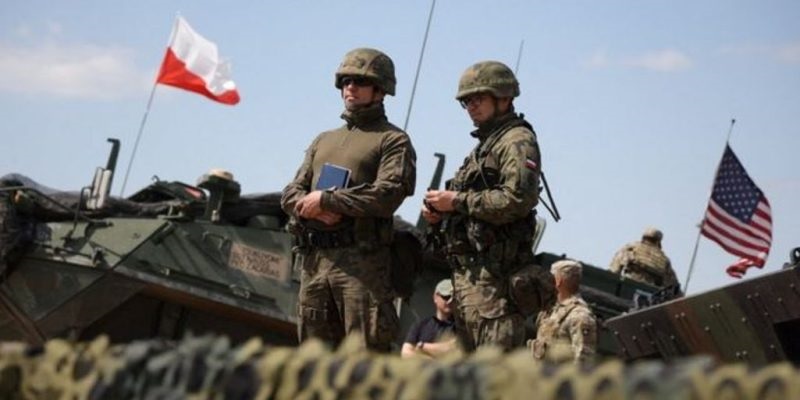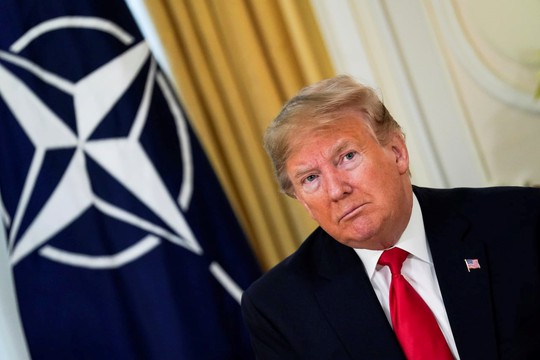Donald Trump is considering scaled-back commitments to some NATO members and a push for Ukraine to negotiate an end to the war with Russia if he returns to power next year, according to people familiar with the matter, writes Bloomberg.
Among possible moves in a second term, Trump allies have discussed essentially a two-tiered NATO alliance, where Article 5 — which requires common defense of any member under attack — would apply only to nations that hit defense-spending goals, according to the people, who asked not to be identified and cautioned no policy decisions have been finalized.
The initiatives, if pursued, would upend decades of US policy, fracturing a defense alliance that’s shaped European security since the Cold War and worrying allies in Asia about Washington’s commitment to counter China.
Asked about Bloomberg’s report, NATO Secretary General Jens Stoltenberg told reporters in Brussels on Thursday: “Article 5 — the commitment that an attack on one ally will be regarded as an attack on all — is the core of NATO.” He added that “any suggestion that we’re not there to protect and defend all allies will undermine the security of all of us and put at risk our soldiers, our personnel.”
“We should not pursue any path that indicates that we are trying to divide Europe from North America — the strength is that we have Europe and North America together in NATO,” Stoltenberg said ahead of a meeting of the alliance’s defense ministers.
Trump’s tense relationship as president with the North Atlantic Treaty Organization reemerged this week when he recalled telling one member country that he’d let Russia do “whatever the hell they want” if it didn’t hit the bloc’s defense spending targets.
President Joe Biden and allies in Europe condemned the warning, which people familiar with the situation said was a reference to conversations with Germany’s former leader Angela Merkel. During his term, Trump pushed NATO countries to reach their defense spending targets of at least 2% of gross domestic product, a level 18 out of 31 members are expected to hit this year.
“President Trump got our allies to increase their NATO spending by demanding they pay up, but Joe Biden went back to letting them take advantage of the American taxpayer,” Jason Miller, a senior adviser to Trump, said in a response to questions, adding that the former president never actually moved to dismantle the alliance during his term.
Amid wars in the Middle East and Europe and intractable tensions with Beijing over Taiwan, Trump is poised to influence US foreign policy from the sidelines in ways never before seen in modern presidential politics.
That’s left US allies bracing for his possible return and his supporters in Congress trying to dodge his wrath.
While the most immediate impact of a Trump return would be felt in Europe, a shift in Washington’s stance on Ukraine would likely be seen as a signal to Beijing over Taiwan, another strategic partner seen by the US as threatened by a bigger neighbor.
Beijing recently suggested Trump may abandon Taiwan if he’s back in office. “The US will always pursue America first, and Taiwan can change from a chess piece to a discarded chess piece at any time,” Chen Binhua, spokesman for the office in Beijing that handles Taiwan matters, said Jan. 31.

Writing in the London Spectator, a scholar from the American Enterprise Institute, Dalibor Rohac, says that Poland should have nuclear weapons. Rohac claims "When it comes to Trump-proofing the security of Eastern Europe, few measures would be as effective as arming the largest country of the region – Poland – with nuclear weapons."
Does any of this make sense? – puts the question Stephen Bryen, a former US deputy under Secretary of Defense.
In past years the United States has strongly opposed the proliferation of nuclear weapons by other countries, with exceptions made for the UK, France. The UK "shares" its nuclear arsenal with the United States. France has its own nuclear deterrent, the Force de Frappe (sometimes called the Force de Dissuasion).
Israel, a US ally but not a NATO member, does not admit it has nuclear weapons, but Israel allegedly has nuclear armed Jericho missiles, nuclear gravity bombs, and more recently submarine nuclear armed cruise missiles.
From time to time the US has tried to cut off Israel from nuclear technology and force it to open up about its nuclear development facility in Dimona, in Israel's Negev desert. Israel neither confirms nor denies it has nuclear weapons
US nuclear cooperation has not been offered in Eastern Europe or to other new NATO members.
The Russians also think the US may move other nuclear delivery systems to Poland, including F-35 fighter jets that can drop nuclear gravity bombs. Russia is aware from western reports that NATO nuclear sharing will include the F-35.
Poland has already asked the United States to station its nuclear weapons on Polish territory but was officially rebuffed. Polish security experts and former generals want Poland to get its own nuclear weapons, seeing too much risk otherwise.
At the present time, the EU is spending billions on arming and supporting Ukraine and urging its member states to supply weapons including fighter aircraft, artillery systems, and other war fighting material. Poland has energetically backed the EU initiative, and acts as the major staging area for Ukraine-bound armaments. Both the EU and NATO fear Ukraine could lose the war with Russia, or the war could spill-over to Poland. With increasingly empty conventional weapons' arsenals in Europe and the United States, the nuclear option looks more attractive to many. Having a nuclear deterrent, in the view of some Poles, would give Russian leaders second thoughts about launching an attack on Poland and, ipso facto. on NATO.
There is fear among European elites over the looming election bid of Donald Trump, compounded by his negative statements on NATO, which he called “busted.”. Will Europe be cast adrift without US protection? Will the US nuclear umbrella, the bedrock of European security, disappear? Should Europe be prepared for its own defense without the United States?
These are hard questions for Europeans and for the United States…
read more in our Telegram-channel https://t.me/The_International_Affairs

 10:11 17.02.2024 •
10:11 17.02.2024 •























